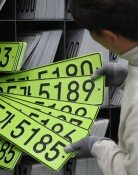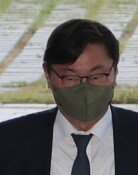Is the President Political or Creative?
Is the President Political or Creative?
Posted August. 17, 2005 06:27,
President Roh Moo-hyuns proposal of a plebiscite of re-confidence amid his close aides corruption scandals emerging in October 2003 was virtually ruled unconstitutional by the Constitutional Court for the reason that a plebiscite cannot be used to decide on whether the president should stay in office.
Not only the recent idea of forming a grand coalition in which the president will hand over his power to the Prime Minister and Cabinet to a level of a parliamentary cabinet system, but also his remarks in a celebration speech to mark the 60th anniversary of Koreas liberation from Japanese colonial rule on August 15 in which he said, Nullifying the statute of limitations in civil and criminal charges by the abuse of state powers, was partly involved in whether they are considered unconstitutional.
Another case is this. In March 2003, when the president decided to transfer the function of financial audits vested in the Board of Audit and Inspection (BAI) to the National Assembly, the BAI opposed his plan on the grounds that since Article 97 of the Constitution stipulates that it takes charge of financial audits and inspects performances, it is impossible without amending the Constitution.
The consistent logic in which a law is not fixed, if purposes are justifiable, it should be interpreted broadly or be amended in accordance with the purposes, underlies President Rohs attitude.
Proposing the idea of a grand coalition once again on July 29, the presidents remarks that in terms of interpreting the Constitution, we should not adhere to the analytical methodology by formal logic and conceptual law, and should not interpret the logic of law to a direction of extremely restricting social reality, also reflects this viewpoint.
President Rohs mindset appears to have been formed from when he started to plead state of affairs cases in the mid-1980s. At that time, lawyer Roh Moo-hyun reportedly firmly insisted on the unjustness of positive law that was being applied as a governing tool for the authoritarian regime, rather than to compromise with the prosecution or bench in a bid to commute their sentences, in the process of pleading for laborers or university students.
President Roh was also put behind bars for 14 days on charges of the violation of the provision, known as a representative poisonous provision of the labor-related law in which a third party must not step in cases, when Daewoo Shipbuilding went on strike in 1987.
By undergoing the process of being transferred to a lawyer taking charge of state of affairs scandals from a lawyer in charge of tax cases after starting his practice in May 1978 in Busan, the president has learned both sides of virtue and vice law has by experience.
Some analyze that frequently proposing ideas to be embroiled in legal controversies is ascribed to the presidents own experiences as a jurist who has realized both sides of the law.
In other words, it can be interpreted as a cycle in which the president himself believes that he is familiar with the law when he suggests a political idea, and that he can invent a new legal logic, which leads to controversy.
Jung-Hun Kim jnghn@donga.com
Headline News
- N. Korea launches cyberattacks on S. Korea's defense companies
- Major university hospital professors consider a day off each week
- Italy suffers from fiscal deficits from ‘Super Bonus’ scheme
- Inter Milan secures 20th Serie A title, surpassing AC Milan
- Ruling and opposition prioritize spending amid tax revenue shortfalls







